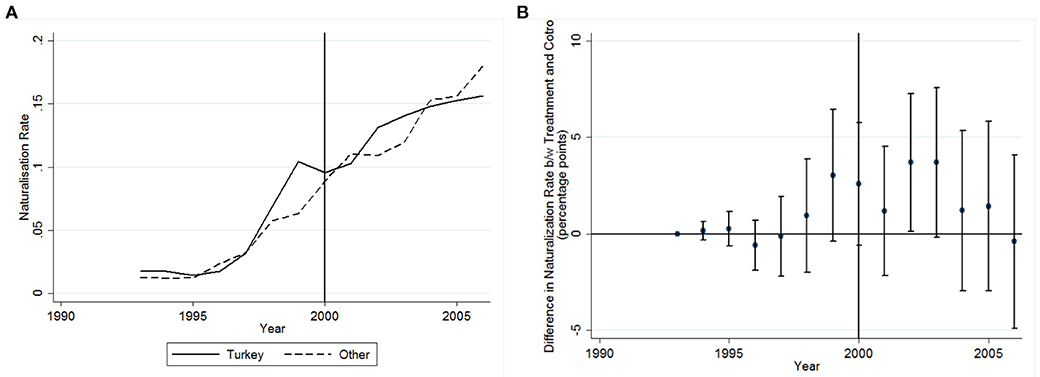
New @FrontSociology paper w Swantje Falcke (@MiLifeStatus) with, I think, intriguing #nullfindings.
Q: did abolishment of “domestic clause” (i.e. #dualcitizenship restriction) in Germany 🇩🇪 affect naturalization rates after 2000?
We find it did not.
\1
frontiersin.org/articles/10.33…
Q: did abolishment of “domestic clause” (i.e. #dualcitizenship restriction) in Germany 🇩🇪 affect naturalization rates after 2000?
We find it did not.
\1
frontiersin.org/articles/10.33…
\2
The “Inlandsklausel” before 2000 exempted German citizens who acquired another citizenship from losing 🇩🇪 citizenship if they lived in 🇩🇪.
This ‘backdoor to dual citizenship’ enabled naturalising migrants to renounce, and then reacquire, their origin citizenship.
The “Inlandsklausel” before 2000 exempted German citizens who acquired another citizenship from losing 🇩🇪 citizenship if they lived in 🇩🇪.
This ‘backdoor to dual citizenship’ enabled naturalising migrants to renounce, and then reacquire, their origin citizenship.

\3
Data: we combine data from SOEP (@DIW_Berlin_en) with @_GlobalCIT data on #citizenship reacquisition policies in origin countries.
Method: we employ a difference-in-differences strategy and compare naturalization rates between 1993 and 2006.
Data: we combine data from SOEP (@DIW_Berlin_en) with @_GlobalCIT data on #citizenship reacquisition policies in origin countries.
Method: we employ a difference-in-differences strategy and compare naturalization rates between 1993 and 2006.

\4
Identification assumption is that, in absence of abolishment of domestic clause, naturalizations across treatment and control groups would have followed parallel trends.
We find that assumption holds.
But: also after 2000, no difference btw treatment and control group
Identification assumption is that, in absence of abolishment of domestic clause, naturalizations across treatment and control groups would have followed parallel trends.
We find that assumption holds.
But: also after 2000, no difference btw treatment and control group

\5
The abolishment of the domestic clause has been referred to as ‘Lex Turka’.
But our #nullfindings also hold for migrants from Turkey 🇹🇷, who are assumed to have made most use of domestic clause.
The abolishment of the domestic clause has been referred to as ‘Lex Turka’.
But our #nullfindings also hold for migrants from Turkey 🇹🇷, who are assumed to have made most use of domestic clause.

\6
So a more restrictive policy resulting from the abolishment of the domestic clause may have closed a backdoor to dual citizenship in 🇩🇪.
But we do not find evidence that this dissuaded migrants from acquiring German citizenship after 2000.
🤔
So a more restrictive policy resulting from the abolishment of the domestic clause may have closed a backdoor to dual citizenship in 🇩🇪.
But we do not find evidence that this dissuaded migrants from acquiring German citizenship after 2000.
🤔
\7
Replication material (incl. reacquisition of #citizenship dataset and codebook) available here: doi.org/10.7910/DVN/L3…
Replication material (incl. reacquisition of #citizenship dataset and codebook) available here: doi.org/10.7910/DVN/L3…
@threadreaderapp unroll
• • •
Missing some Tweet in this thread? You can try to
force a refresh







